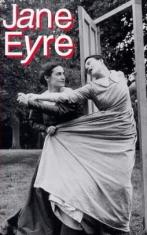Jane Eyre - Trafalgar Studios 2006
Written by Charlotte Brontë - a parson's daughter from an isolated village surrounded by bleak moors in my native Yorkshire - 'Jane Eyre' caused something of a stir when first published in the rigid and prudish, male-dominated Victorian England of 1847. Because Brontë's disturbing and sensually charged novel portrayed the antithesis of what society of the day dictated a typical Victorian woman was supposed to be like. Jane Eyre not only rages with passion more than equal to that of any man, but thirsts for knowledge, love and experiences that were generally denied to her sex at the time. Charlotte Brontë drew extensively from her own life experiences in writing the novel, contriving a compelling storyline from the harsh realities of life in Victorian England, and forcefully advocating a different role for women - in a very real sense, 'Jane Eyre' is as much about women's rights, status and needs as anything that might have come from the pen of a feminist writer in post-war twentieth century Britain.
We first meet the orphaned Jane Eyre while she's living with her cruel but wealthy aunt. We soon realise that, even at the tender age of 10, Jane is already strong-willed and determined, and finds herself at odds with the puritanical and authoritarian society around her. Her violent tantrums quickly land her in a locked room as punishment, and she's immediately dispatched to the harsh environment of a boarding school where survival seems more a matter of chance than anything else. Against all the odds, 'plain' Jane survives the brutal realities of her school, acquires an education and obtains a post as Governess at Thornfield, the home of the handsome but somewhat enigmatic Mr Rochester. Unknown to Jane, her employer harbours a secret that will impede their developing romance.
Polly Teal's small but well-directed company make it seem like there's a cast of hundreds milling around behind the set, and the fast-moving pace helps to overcome the stickier moments when the dialogue and exposition have a tendency to get bogged down and drag a little. James Clyde is an appropriately dashing and suavely handsome Rochester who is capable of laughing at his own foibles whilst commanding respect. And Monica Dolan is suitably 'plain' in the lead as Jane, but also exudes a convincing passion and determination in spite of fierce odds and lures that would have her compromise her convictions and needs. But her northern accent was inconsistent which grated a little against my upbringing, even allowing for the obvious explanation of her refining education and new-found status. I would have preferred Nolan to take more of a risk, by giving us a Jane with a robust northern accent throughout.
Neil Warmington's almost crumbling design with a sweeping but dilapidated staircase and dramatic, doom laden clouds, defines a society in decay and characters in turmoil. And these features are reflected in and heightened by Peter Salem's eerily abrasive music. Together they provide an intense, almost suffocatingly atmospheric backdrop.
In many ways this is a conceptually inspired, psychological production which certainly pulls no punches. But I worried about the humour involved in having actors 'playing' animals. Although it worked quite well in the earlier scenes - lightening and relieving the intensity for a while - the humour which had been invested in these 'characters' rather spoilt the later scenes, particularly the final reunion and resolution. In any case, I find these final scenes, which bring Rochester and Jane together, less satisfying or convincing, because it's only when Rochester is physically impaired and thus less than the man he was that Jane feels she 'loves him better now that she can be of use to him'. But dependence isn't love, and that seems to fly in the face of what has gone before at least to the extent that the characters have not achieved equality, and it suggests - though it can be interpreted in different ways, of course - that Jane is fading into the stereotypical slot that Victorian society had in mind for women, and that her passion is spent or quenched.
Still, this is an inspiring and arresting production, if not definitive. But because of my reservations about the humour and the ending, falls a little way short of being a true 'classic'. Nevertheless it's innovative and driving compulsion certainly make three hours fly by quite effortlessly.
What the popular press had to say.....
CHARLES SPENCER for THE DAILY TELEGRAPH says, "It is, in fact, one of the finest and most searching stage adaptations of a great novel I have ever seen." BENEDICT NIGHTINGALE for THE TIMES says, "The Shared Experience style — pacy, informal, inventive, physically expressive — keeps you gripped."
External links to full reviews from popular press
Daily Telegraph
The Times
Production photo by Robert Day
Originally published on
